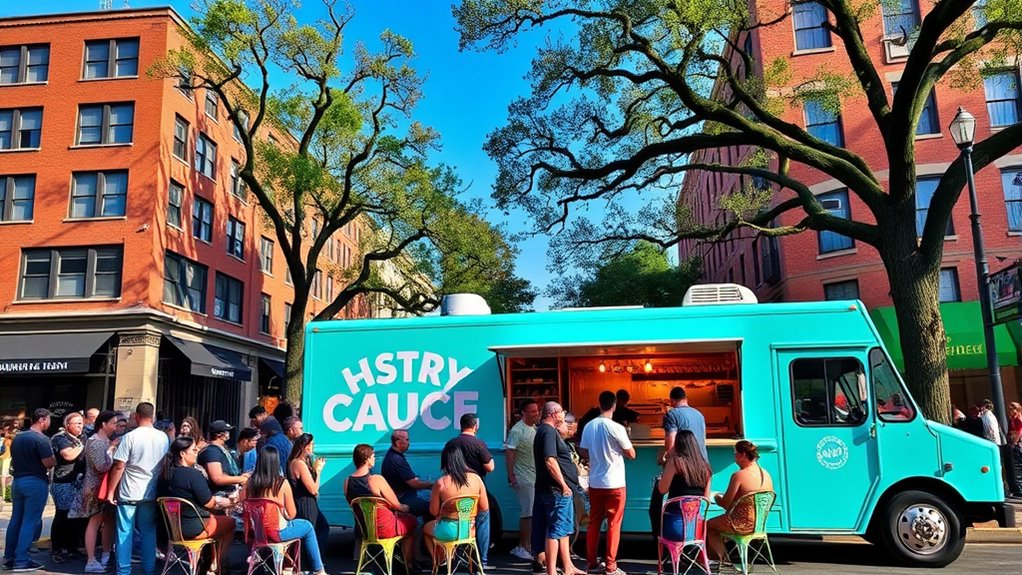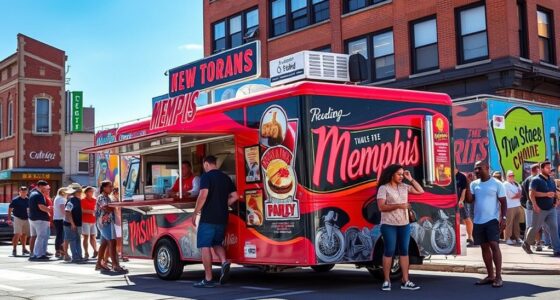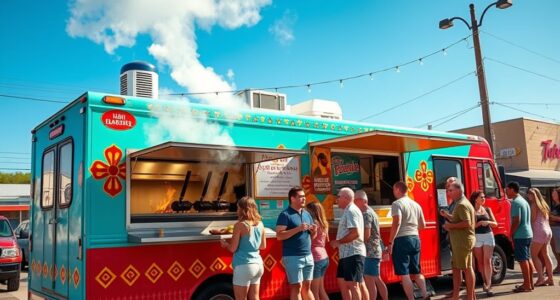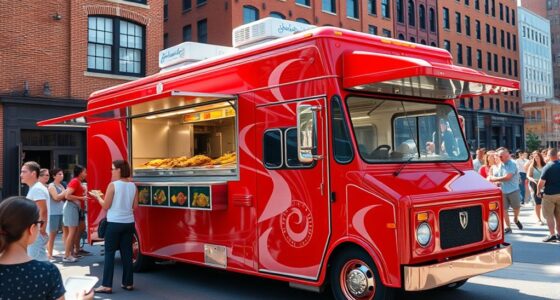To start a food truck in Birmingham, AL, you’ll need to navigate local regulations, secure permits, and find approved operating zones. Develop a standout menu using fresh local ingredients, set competitive prices, and consider funding options like grants or loans. Build your brand with eye-catching displays and participate in community events to boost visibility. With the right planning and community engagement, you can carve out your niche in Birmingham’s vibrant food scene—more tips await if you keep exploring.
Key Takeaways
- Research Birmingham’s local food truck regulations, permits, and designated operating zones via the city’s online portal.
- Develop a unique, recognizable brand identity and engaging menu featuring local and seasonal ingredients.
- Register your business, secure necessary permits, and plan an efficient, compliant kitchen setup.
- Explore grants and financing options through Birmingham’s small business programs to support startup costs.
- Join local food festivals and community events to increase visibility, build relationships, and grow your customer base.
Vibrant Birmingham Food Scene
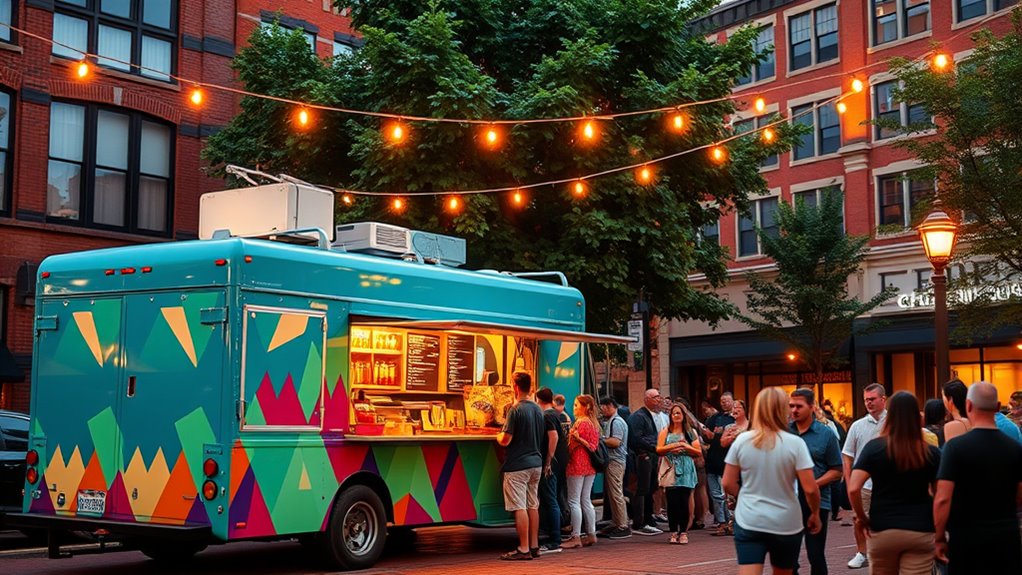
Birmingham’s food scene is undeniably vibrant, with a diverse array of flavors that cater to every palate. As a food truck owner, you’ll find countless opportunities to stand out through effective food truck branding. Creating a memorable identity helps attract local customers and build loyalty. Social media marketing plays a vital role here; by actively engaging with your audience online, you can showcase your offerings, share behind-the-scenes content, and promote special events. Birmingham’s lively food culture means there’s a built-in audience enthusiastic to try new cuisines and support local vendors. By combining strong branding with consistent social media presence, you’ll position your food truck for success in this dynamic culinary landscape. Embrace Birmingham’s diversity and use it to your advantage. Incorporating STEM-inspired problem-solving toys into your marketing strategy, such as interactive digital content or engaging demonstrations, can further attract curious customers and create memorable experiences.
Understanding Local Requirements
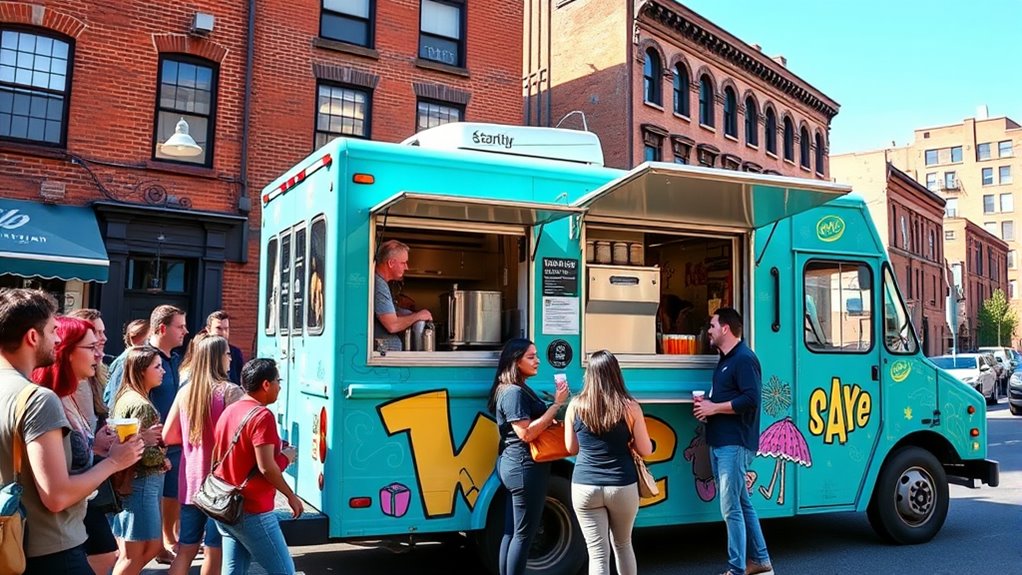
To get started, you’ll want to familiarize yourself with Birmingham’s online permit application portal, making the process smoother and more efficient. You should also keep an eye on the scheduled inspection timelines to ensure you stay compliant and avoid delays. Ultimately, understanding the designated truck zones will help you choose the best locations for your food truck’s success. Additionally, researching the local regulations for food truck operations can prevent potential issues and streamline your approval process.
Online Permit Application Portal
Accessing the online permit application portal is a straightforward way to meet Birmingham’s local requirements for food truck operations. This digital licensing process simplifies obtaining your necessary permits, saving you time and effort. Through the portal, you can submit your online permit application, track its progress, and receive approval notifications efficiently. Be sure to gather all required documents beforehand to avoid delays. Here’s a quick overview:
| Step | Action | Notes |
|---|---|---|
| Register | Create an account on the portal | Use a valid email address |
| Complete Application | Fill out the online permit form | Ensure accuracy |
| Upload Documents | Submit required permits and IDs | Check file formats |
| Pay Fees | Make digital payment | Confirm transaction |
| Track Status | Monitor progress through portal | Follow up if needed |
This streamlined process makes digital licensing accessible and efficient.
Scheduled Inspection Timelines
Are you aware of the scheduled timelines for food truck inspections in Birmingham? Knowing the inspection schedules helps you stay compliant and avoid delays. Birmingham typically conducts inspections annually or semi-annually, depending on your specific permit and food operations. These inspections ensure your truck meets health and safety standards before renewal. It’s vital to track when your permit is due for renewal and schedule inspections accordingly, as missing deadlines can lead to fines or permit suspension. Birmingham’s health department provides a clear calendar of inspection dates, so you can prepare in advance. Staying proactive with scheduled inspections not only keeps your truck compliant but also demonstrates your commitment to food safety, making permit renewals smoother and more predictable.
Designated Truck Zones
Understanding designated truck zones is essential for operating your food truck smoothly in Birmingham. These zones help you find legal truck parking and streamline location scouting, avoiding fines or disruptions. Birmingham has specific areas reserved for food trucks, so it’s vital to learn where these zones are before setting up.
- Research local signage and posted regulations
- Identify approved truck parking spots in your target neighborhoods
- Check for time restrictions in designated zones
- Consult city maps for truck zone locations
- Plan your routes and setup times accordingly
Setting Up Your Base of Operations
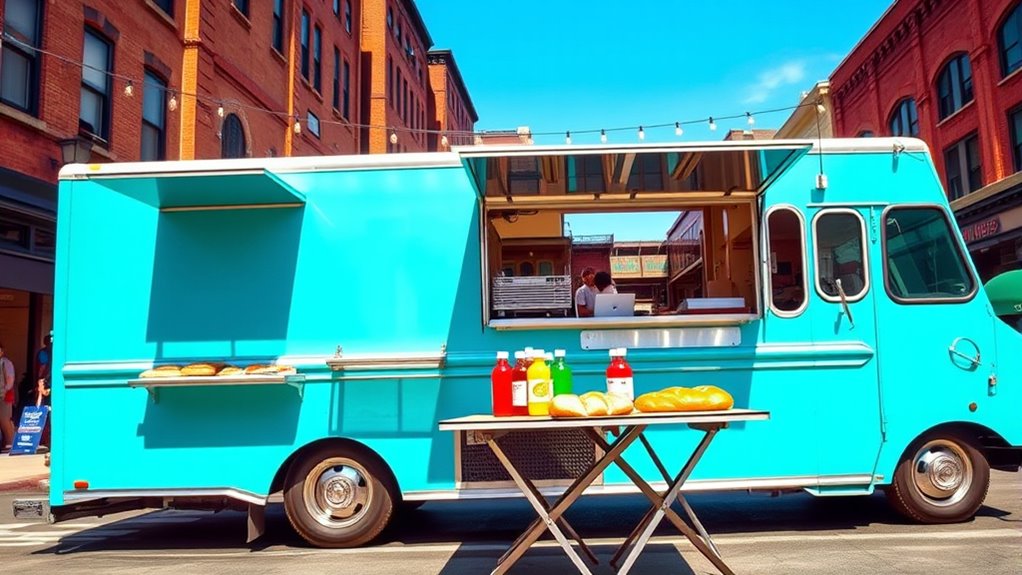
Setting up your base of operations starts with choosing the right kitchen setup, whether you opt for shared licensing options or a custom-designed space. You’ll need to plan your kitchen layout carefully to meet health codes and maximize efficiency. Color accuracy and proper lighting are important considerations to ensure your workspace is both functional and compliant. By making these decisions, you set a strong foundation for your food truck business to thrive.
Shared Kitchen Licensing Options
Choosing a shared kitchen is a practical way to establish your food truck’s base of operations without the high costs of a dedicated facility. It simplifies obtaining the necessary shared kitchen licensing and helps you navigate co-working kitchen regulations. These facilities often have pre-approved licenses, saving you time and hassle. Before signing up, check if the shared kitchen complies with local health and safety standards. Ensure they offer the equipment you need and understand their policies on food storage and prep. Some shared kitchens also provide flexible hours, which can be beneficial as your business grows. Remember to verify if the licensing transfers easily and if the location aligns with your target market. This approach allows you to focus on your menu and service without worrying about complex permits.
Custom Kitchen Layout Planning
Designing your custom kitchen layout is a essential step in establishing an efficient and functional food truck operation. Focus on kitchen ergonomics to guarantee smooth workflow and safety, minimizing unnecessary movement. Start with layout visualization to plan space allocation for cooking, prep, and storage areas, making sure each zone flows logically into the next. Consider equipment placement carefully to maximize efficiency and prevent bottlenecks during busy service times. Keep in mind that a well-thought-out layout helps reduce fatigue and speeds up service, which is critical for customer satisfaction. Use sketches or digital tools to refine your design before installation. By prioritizing ergonomic design and clear layout visualization, you’ll create a seamless workspace that supports your culinary success on the road.
Budgeting and Financing Your Food Truck
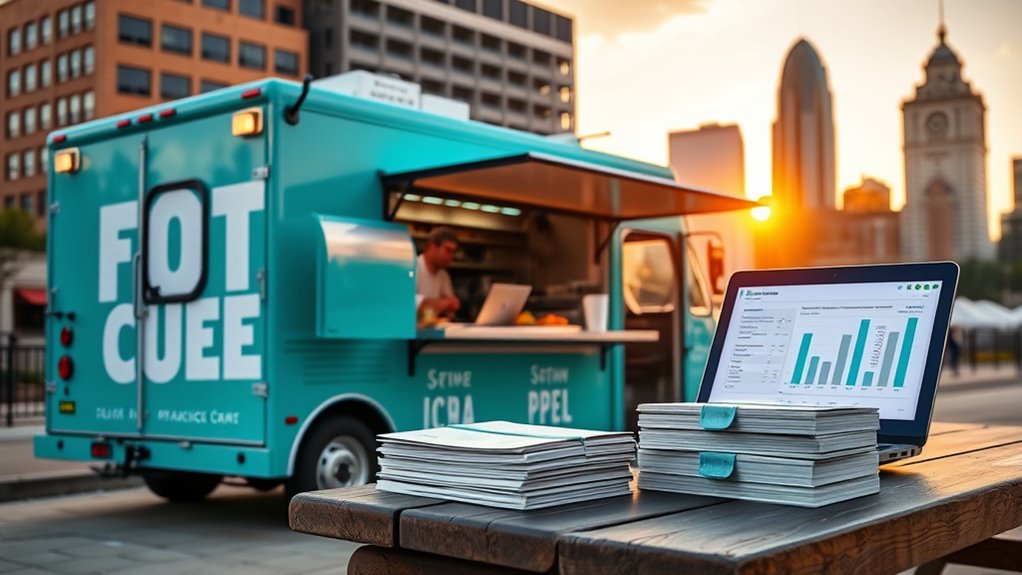
When planning your food truck, you need to consider the initial costs of buying or leasing your vehicle. Local financial assistance programs can help ease some of the upfront expenses, so be sure to explore those options. Don’t forget to budget for liability coverage to protect your business and ensure you’re fully covered.
Initial Vehicle Purchase Costs
Buying your first food truck is a major investment, and understanding the initial costs is essential for effective budgeting. The vehicle itself can range from $20,000 to $100,000, depending on size and customization. Remember, vehicle depreciation begins immediately, impacting resale value down the line. You’ll also need to contemplate insurance premiums, which vary based on coverage and truck type. Additional costs include equipment upgrades, licensing fees, and initial inventory. To stay on track financially, factor in these expenses early. Proper planning ensures you avoid surprises and set a solid foundation for your food truck business. Being aware of these costs helps you make informed decisions and keeps your startup budget realistic.
Local Financial Assistance Programs
Are local financial assistance programs a viable option to help fund your food truck? Absolutely. Birmingham offers several grant programs designed to support small businesses, including food trucks. These grants don’t need repayment and can cover equipment, permits, or marketing. Additionally, loan options are available through local banks or community development agencies, often tailored for startups. These loans typically have flexible terms and competitive interest rates, making them accessible for new entrepreneurs. Applying for both grants and loans can diversify your funding sources, easing your initial financial burden. To maximize your chances, research specific programs available through Birmingham’s economic development offices or small business associations. Securing funding through these channels can give your food truck a strong start without overly stretching your resources.
Liability Coverage for Food Trucks
Liability coverage is a crucial aspect of budgeting and financing your food truck because it protects your business from costly legal claims and accidents. Understanding insurance requirements and securing adequate liability coverage ensures you’re financially prepared for unforeseen incidents. Without proper coverage, a single accident or injury could threaten your business’s stability. When selecting liability coverage, consider factors like the size of your operation and local regulations. This coverage can help pay for property damage, bodily injury, or legal fees. Be proactive by:
- Comparing insurance policies tailored for food trucks
- Ensuring coverage meets Birmingham’s local regulations
- Evaluating the limits of your liability coverage
- Including coverage for equipment damage
- Understanding exclusions and additional endorsements
Proper liability coverage offers peace of mind and keeps your food truck business protected.
Designing Your Menu and Pricing Strategy
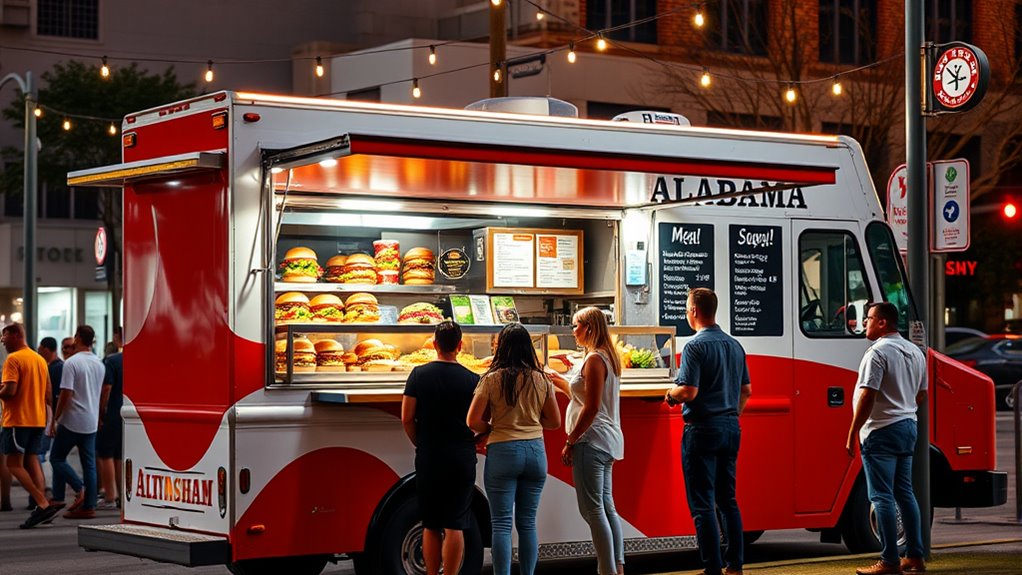
When designing your menu, consider how seasonal ingredients can keep your offerings fresh and cost-effective. Calculating ingredient costs helps make certain your prices cover expenses while remaining competitive. Focusing on smart sourcing strategies allows you to balance quality, seasonality, and profitability. Additionally, understanding dream symbolism can inspire creative dishes that resonate emotionally with customers.
Seasonal Ingredient Sourcing Strategies
Incorporating seasonal ingredients into your menu allows you to offer fresh, flavorful dishes while managing costs effectively. By focusing on seasonal produce and prioritizing local sourcing, you can create dishes that resonate with customers and stay affordable. To optimize your sourcing strategies, consider these approaches:
- Build relationships with local farmers for reliable seasonal produce
- Adjust your menu based on what’s in peak season
- Shop at farmers’ markets for fresh, local ingredients
- Use preservation techniques like freezing or pickling for off-season use
- Incorporate versatile ingredients that can be used across multiple dishes
These strategies help you maintain quality, support local producers, and keep your menu dynamic and cost-efficient. Leveraging seasonal produce and local sourcing ensures your food truck stays fresh and appealing year-round.
Ingredient Cost Calculations
Understanding your ingredient costs is essential for designing a menu that balances quality and profitability. By conducting a thorough cost analysis, you can determine accurate ingredient pricing for each dish. Start by calculating the cost of raw ingredients used in your recipes, considering portion sizes and waste. This helps you set realistic menu prices that cover costs while remaining competitive. Keep in mind that fluctuating prices, especially for seasonal ingredients, require regular updates to your cost analysis. Incorporate ingredient pricing into your overall pricing strategy to ensure each item contributes to your profit margin. Being precise with ingredient cost calculations allows you to make informed decisions about menu offerings and pricing, ultimately supporting your food truck’s financial health and success in Birmingham.
Technology and Operations
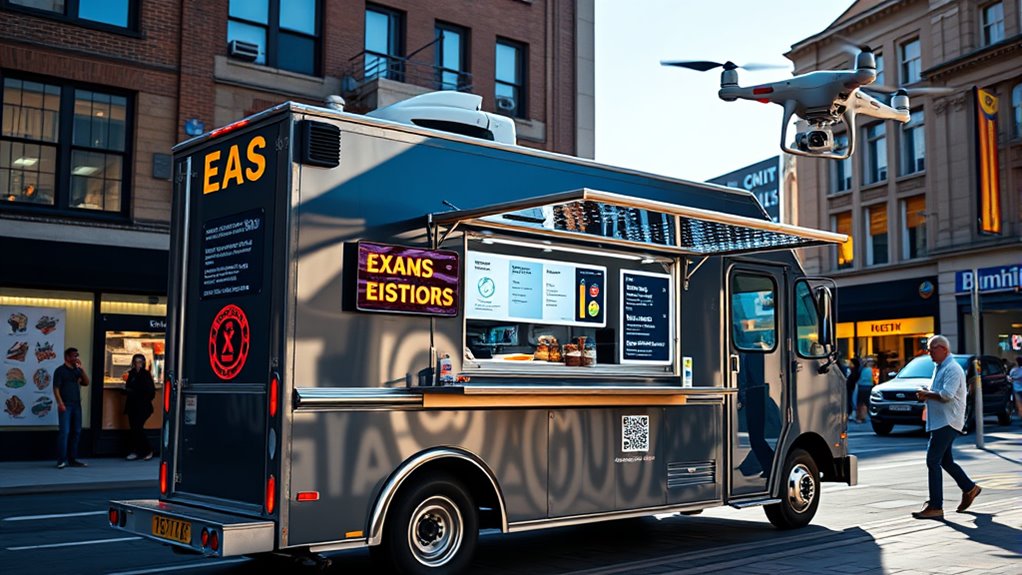
Using mobile card readers simplifies your sales process and speeds up transactions. Real-time stock tracking software helps you stay on top of inventory levels and reduce waste. Together, these tools streamline your operations and keep your food truck running smoothly. Implementing gift inspiration tools can also boost customer engagement and repeat business.
Mobile Card Readers for Sales
Mobile card readers are essential tools that allow food truck operators to accept credit and debit card payments quickly and securely on the go. They enable smooth transactions, making it easier for customers to pay via cashless payments and mobile payment systems. By using these devices, you can speed up service and reduce cash handling risks. Look for features like compatibility with smartphones and tablets, low transaction fees, and robust security measures. Consider integration with your POS system for seamless sales tracking.
- Accepts multiple payment types, including contactless
- Compatible with popular mobile payment apps
- Real-time transaction processing
- Easy to set up and operate
- Offers fraud protection and security features
Real-Time Stock Tracking Software
Real-time stock tracking software streamlines inventory management by providing instant updates on product levels. With this technology, you can monitor stock quantities accurately, reducing waste and preventing shortages. It simplifies supply chain logistics by giving you real-time data on what’s in hand and what needs reordering. This allows you to make informed decisions quickly, ensuring your food truck runs smoothly during busy hours. You won’t have to rely on manual counts or guesswork, saving time and minimizing errors. Plus, integrating this software with your other systems helps maintain efficiency from purchasing to sales. Overall, real-time stock tracking keeps your inventory organized, improves your operational flow, and ensures you’re always prepared to meet customer demand without overstocking.
Marketing and Growing Your Presence
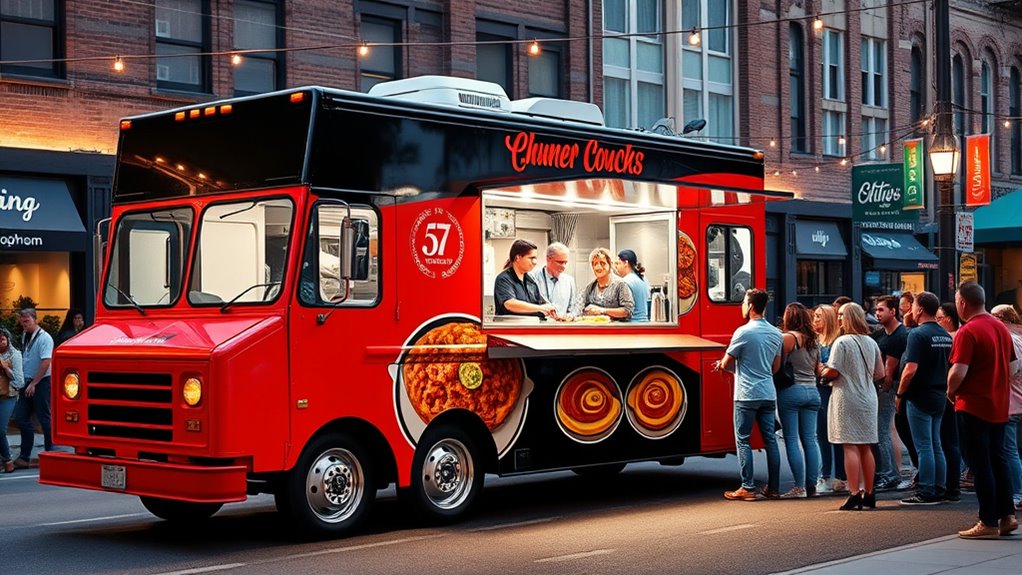
Participating in popular food truck events can boost your visibility and attract new customers. Engaging Instagram campaigns help you connect with your audience and showcase your offerings. Combining both strategies makes it easier to grow your presence in Birmingham’s vibrant food scene.
Popular Food Truck Events
Attending popular food truck events is one of the most effective ways to boost your presence and attract new customers in Birmingham. These events offer prime opportunities to showcase your food truck branding and connect directly with your target audience. Proper event scheduling guarantees you don’t miss key gatherings that align with your menu and brand identity. To maximize impact, contemplate participating in events like food festivals, farmers markets, and city-sponsored gatherings. Building relationships with event organizers can also lead to repeat opportunities. Keep your branding consistent and eye-catching to stand out. Remember, the more you engage with the community through these events, the stronger your reputation becomes. Here are some top food truck events to consider:
- Birmingham Food Truck Festival
- Local Farmers Markets
- City Summer Events
- Holiday Markets
- Charity Fundraisers
Engaging Instagram Campaigns
Leveraging Instagram campaigns can substantially boost your food truck’s visibility and attract new customers in Birmingham. To maximize Instagram engagement, focus on creating eye-catching photos of your dishes, behind-the-scenes content, and customer stories. Use consistent branding and relevant hashtags to reach a broader audience. Implement effective campaign strategies like contests, limited-time offers, and collaborations with local influencers to encourage interaction. Respond promptly to comments and messages to build relationships and foster loyalty. Posting regularly and at best times ensures your content stays top of mind. Remember, engaging content that highlights your food truck’s personality and community involvement can turn casual viewers into loyal customers. Well-crafted campaign strategies make your Instagram presence a powerful tool for growth and customer engagement.
Master Birmingham’s Vibrant Food Scene
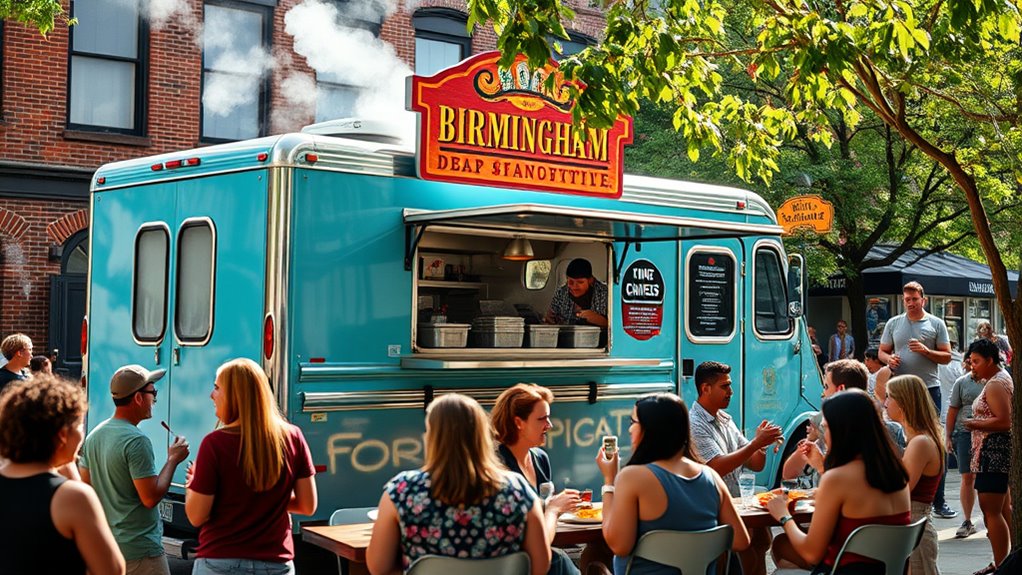
Have you ever wondered what makes Birmingham’s food scene so exciting? It’s a vibrant mix of local flavors, innovative chefs, and passionate food truck owners like you. To master this scene, focus on standout food truck design to attract customers and create a memorable experience. Ingredient sourcing is essential—use fresh, local ingredients to elevate your dishes and build trust with your patrons. Birmingham’s diverse culinary landscape means you can experiment with regional favorites and international cuisines. Embrace collaborations with local farmers and artisans to stay authentic and connected. Keep an eye on food trends, and adapt your menu accordingly. By understanding what’s happening around you and emphasizing quality, you’ll carve out your place in Birmingham’s lively food scene.
Frequently Asked Questions
What Permits Are Needed Specifically for Street Vending in Birmingham?
You’ll need to obtain street vending licenses from Birmingham city, ensuring your business complies with local regulations. Additionally, you must adhere to Birmingham health codes, which include food safety standards and sanitation requirements. It’s essential to apply for the proper permits before hitting the streets. Contact the Birmingham Department of Health and City Licensing Office to get started and make sure your food truck operations are fully legal and safe.
How Do Birmingham’s Weather Conditions Affect Food Truck Operations?
Ever wondered how Birmingham’s weather impacts your food truck? Weather impacts your daily operations, from heat and humidity to sudden rainstorms. You’ll need seasonal planning to stay ahead, like investing in fans or shade for hot days and waterproof coverings for rain. Birmingham’s unpredictable weather means preparing for all conditions, ensuring your truck runs smoothly year-round and keeps customers coming back, no matter the season.
Which Local Suppliers Are Recommended for Sourcing Ingredients in Birmingham?
You should explore local produce vendors like Pepper Place Market and food distributors such as Sysco Birmingham. These suppliers offer fresh, quality ingredients that can set your food truck apart. By sourcing locally, you support the community and guarantee your menu is vibrant and seasonal. Reach out to these vendors early to build relationships and secure consistent supplies, helping your food truck thrive in Birmingham’s lively culinary scene.
Are There Any Birmingham-Specific Food Safety Regulations to Consider?
You should be aware that Birmingham has specific food safety regulations you must follow. Local food safety inspections ensure your truck meets health standards, and Birmingham health codes detail requirements for food handling, storage, and sanitation. To avoid fines or shutdowns, regularly check with the Birmingham Department of Health, stay updated on local regulations, and maintain strict hygiene practices. This proactive approach helps you stay compliant and ensures customer safety.
How Can I Participate in Birmingham’s Food Truck Festivals and Events?
To participate in Birmingham’s food truck festivals and events, you should connect through food truck networking groups and local social media pages. Reach out to event organizers early and showcase your unique offerings. Use event promotional strategies like offering samples or discounts to attract attendees. Consistently engage with the community online and offline to build your reputation and increase your chances of securing spots at popular festivals and events.
Conclusion
Starting a food truck in Birmingham puts you at the heart of a city where over 30% of residents enjoy diverse, vibrant cuisines. With the right planning, your unique offerings can thrive in this bustling scene. Remember, success often depends on understanding local tastes and regulations. By leveraging Birmingham’s lively food culture and staying adaptable, you’ll join a thriving industry, with food trucks contributing over $1 billion annually to the local economy.
